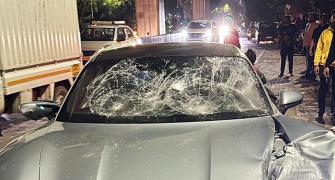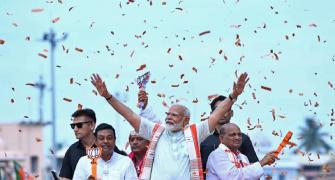It is a well-known fact that the Indian Mujahideen has been one of India's deadliest homegrown outfits. While a large number of their cadres have been arrested, many of their top leaders are still at large.
Though an input from the home ministry suggests that the IM is recruiting, but their presence has come down a great deal. This indicates that the outfit is currently down and is still trying to re-build itself.
The ministry note states that the IM's strongest presence is in Uttar Pradesh, Bihar, Karnataka, Delhi and Maharashtra, and according to reports from the Intelligence Bureau, they are being recruited from these very places.
IB sources say that the last straw for the IM however was the busting of the Bihar module. It is considered to be a relatively new module, and it carried out a couple of operations on a smaller scale. According to the IB, the operations were hurried, since it is extremely important for them to carry out strikes so that their recruitment process can continue.
Off late, due to immense crackdowns, youth seem to have stayed away from the IM, making matters tough for them. The support level from across the border too has gone down, and the IB feels that this is an intentional strategy.
The Bihar module was however an important module, and had it not been tracked down immediately it could have well seen the re-emergence of a very strong outfit once again.
The home ministry however adds that the agencies are on their toes, and would do everything possible to ensure that the outfit does not stage a re-emergence.
Recently an IM module was busted and 10 persons were arrested from Delhi, Bihar, UP and Tamil Nadu.
There exists a very close and effective coordination among intelligence agencies at the Centre and State level. Intelligence inputs about possible designs and threats are shared with the state governments on a regular basis.
The Multi Agency Centre (a top central intelligence unit with representation from all intelligence agencies) has been strengthened and reorganised to enable it to function on a 24x7 basis for real-time collation and sharing of intelligence with other agencies.
Security intelligence inputs are also shared with the concerned states through the established mechanism, which ensures close coordination and sharing of intelligence and seamless flow of information between the State and the Central security and law enforcement agencies.
This has resulted in busting of terrorist modules, and a number of possible terrorism attacks have been averted.
However, for the police, more important than nabbing operatives is understanding the operations. Although all the 10 recently-arrested operatives have divulged information, the police is still finding it difficult to get a complete picture of the operation.
In certain cases, the police have found the attacks to be inter-connected. Take the Bengaluru and Delhi attacks for instance. However, while investigating the 13/7 Mumbai attacks, there appears to be no connection between the modules at all.
In all places where the blasts took place, the IM has had a strong presence and it could well have been a stray operation.
Take the case of Kamal Hasan, a close aide of IM operation head Yasin Bhatkal, who was arrested in Kolkata last month and brought to Bengaluru. The police say that he could be a southern commander for the force.
From preliminary investigations it appears as though Hasan was in the know of things and more of a logistic provider for the IM. Sources say that Hasan who hails from Madhubani in Bihar is closely related to a person who worked in an ammunition factory and here he picked up skills on preparing explosives.
The other angle to the Hasan case is that he worked along with Yasin and provided logistic support during the Bengaluru and Delhi attacks.
The IB says that today the IM is in disarray. The funds, recruitments and the planning is being carried out by fringe elements in the group and there is no real coordination with Pakistan's Inter-Services Intelligence, as was the case a few years ago.
This should not however be construed to be a detachment by the ISI. With plenty of international heat on the ISI, it would like the IM to operate exactly how it is operating today with no involvement whatsoever.
It has done its bit in protecting the biggies such as Abdus Subhan (a suspect in the 2006 Mumbai train blasts) and the Bhatkal brothers, as these men could lead the investigators to the Pakistani establishment. The IB says that it is only when a major operation is planned by the ISI will the IM cadres be taken into their fold for logistic support within India.





